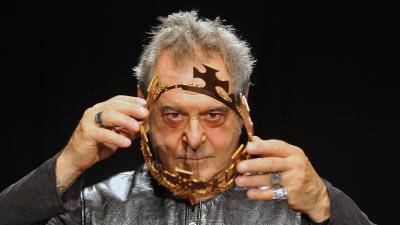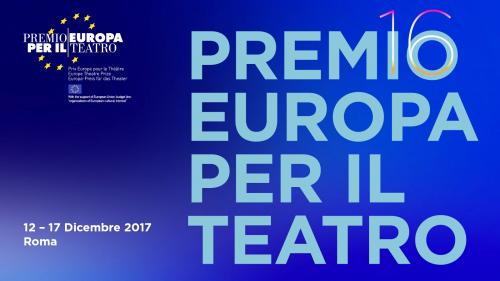Europe Theatre Prize returns to the Italian stage

ROME - From Tuesday to Sunday, the Eternal City will play host to the XVI edition of the Europe Theatre Prize and the XIV edition of the Europe Prize Theatrical Realities. This is a rare opportunity to meet and get to know the winning artists, to attend their performances, and learn more about their approach to theatre. The Teatro di Roma is supporting the organization of the event. The Prize forms part of the celebrations for the 60th anniversary of the Treaties of Rome and the G7 group of countries, as a special project of the Ministry of Culture, with the approval of the President of the Italian Republic. These celebrations coincide with the 30th anniversary of the Europe Theatre Prize, the first cultural initiative in the field of performing arts to be promoted by the European Community. The Prize has also been chosen as the opening project of the European Year of Cultural Heritage 2018.
The Europe Theatre Prize and its supporting Board of Advisors have awarded the XVI Europe Theatre Prize to two emblematic figures of the international scene, two actors whose theatrical background played a key role in the selection process: Isabelle Huppert and Jeremy Irons, artists capable of ‘migrating’ from the dimension of theatre to that of cinema and vice-versa. Therefore, a long time after its award to Michel Piccoli, the prize is once more given to actors. The two artists will share the stage together, taking part in a production especially devised for the Europe Prize: a performance of Ashes to Ashes, by Harold Pinter. Afterwards, Isabelle Huppert will read from Guy de Maupassant.
This year the Prize considered it of major importance to assign two more prizes: a Special Prize to Wole Soyinka, writer, playwright and poet, winner of the Nobel Prize for Literature in 1986, who, through his work, has been able to create an ideal bridge between Europe and Africa: a commitment that is back in focus, taking into account the current problematic relationship between the Old Continent and Africa. For similar reasons a Special Mention is given to Fadhel Jaibi, director of the National Theatre of Tunis, a man of theatre who has been able to retain a clarity of thought and critical sense during the present period of turmoil, illusions and disillusions that has marked the lives of the populations of the Maghreb and the wider Arab world.
Since the Europe Prize Theatrical Realities was established, after the third edition of E.T.P, great effort has been put into a search for the most creative, significant, and innovative theatrical initiatives in European drama, regardless of styles, articulations, and forms of expression, without limitations of genres.
The Jury for this XIV edition of the Europe Prize for Theatrical Realities decided not to acknowledge many eminent candidates who despite their relative youth have already reached international status. The Jury has thus made six choices:
Susanne Kennedy, the “cruel” and ironic Dutch (and slightly German) director, will present The Virgin Suicides. She is a director who explores the link between theatre and other forms of art, who makes actors, words, and ideas move and intertwine in works performed in spaces that are at times theatres, at times visual art installations. Jernej Lorenci, a candidate since 2011, will tackle Alfred Jarry’s Ubu Roi. He is a magisterial director whose main aim is to establish a special flow of emotions between stage and audience. Yael Ronen, a candidate since 2009, will be present at the head of a Roma Armee to champion the variety and diversity of “other” European peoples, and she will also read from The Situation. She is a cosmopolitan playwright and director capable of portraying tragic socio-political situations with light humor, thus increasing the audience's awareness of urgent and outrageous political situations. Her admirable work in Israel with Israeli and Palestinian actors has continued in Germany with Syrian actors.
Alessandro Sciarroni is a visual artist, dancer, and performer who always astonishes those trying to pin him down to one single genre. He will present his creation Untitled and a work-in-progress: Cowboys. Kirill Serebrennikov, author, film and theatre director, teacher, scenographer and inventor of new scenic spaces is an all-round brilliant and innovative artist. Theatre NO99, a candidate since 2010, is an acting company that combines political commitment with a working method based on a steady and active cooperation and interaction between director and actors. They will be present with the production of NO 43 - Filth. The President of the Jury and E.T.P, in agreement with the Council, have also decided to confer a Special Prize to Dimitris Papaioannou, a well-deserved prize for this director and visual artist, a candidate since 2007, whose fame and prestige have reached the highest levels of European theatre in recent years. His contribution is important enough for us to consider this Special Prize urgent, deserved and proper.
The Prize is also more than a mere moment of celebration. The artists, for instance, make their contribution through performances, premieres, readings, and workshops. They will take part in meetings and conferences in order to give theatergoers, critics, and students of theatre a chance to gain insights into their way of making theatre. Usually, such meetings gather testimony from those who, in one way or another, have participated in the artistic career of the theatre person or company, together with reflections from critics, scholars, and journalists from the international press.
The Returns section features productions from award winners in previous editions of the event. This year it will include performances of Giorgio Barberio Corsetti 's King Lear, while Robert Wilson, together with the National Academy of Drama Silvio D’Amico, reinterprets einer ller's Hamletmachine, and Peter Stein brings Shakespeare's Richard II.
About the Europe Theatre Prize
The Europe Theatre Prize, whose first edition took place in 1987, was launched in 1986 as a pilot programme in the theatre field by the European Commission under Jacques Delors and whose first Commissioner of Culture was Carlo Ripa di Meana. In those years a significant contribution was made by Melina Mercouri, patroness of the first edition of the Prize, and by Jack Lang, in those days French Minister of Culture and current President of the Prize. Thanks to its major role and its activity, since 2002, the Prize is recognized by the European Cultural Parliament and the European Council as a “European cultural interest organization”.
The Europe Theatre Prize promotes, in the setting of live performances, interdisciplinarity, integration, and co-operation between theatre and other arts.
Its aims are to promote the knowledge and diffusion of drama throughout Europe, to advance the development of cultural relationships and to strengthen the European conscience. Europe Theatre Prize assigns, among others, two awards: the Europe Theatre Prize and the Europe Prize Theatrical Realities.
The Europe Theatre Prize for a career is awarded to individuals or theatrical institutions (theatres, companies) that have contributed to the realization of cultural events which have promoted understanding and the exchange of knowledge between peoples. The prize is awarded for the work of a career and the winner is chosen for the whole of his artistic path among notable personalities of international theatre, considered in all its different forms, articulations and expressions.
The Europe Prize Theatrical Realities - EPTR - has been awarded alongside the Europe Theatre Prize since its third edition. The Europe Prize Theatrical Realities is aimed at encouraging trends and initiatives in European drama, considered in all its different forms, articulations and expressions, also considering dance and music in their theatrical expression.
In its selection of the candidates for the Europe Prize Theatrical Realities, the Jury is assisted and helped by a Council (400 participants) made up of the Prize associate bodies, past prize-winners, critics, journalists, directors of theatres and festivals, and representatives of cultural institutions. After nine editions held in Taormina, the Prize became itinerant. The X edition was held in Torino, following the two in Thessaloniki, then in Wroclaw, Saint Petersburg and last year in Craiova. This year the Prize has finally come back to Italy, in Rome.
Info:
Premio Europa per il Teatro, Via S. Quasimodo, 14, (I) 95027 S. Gregorio di Catania
Tel. 00.39.095.7210508, Fax. 00.39.095525251
info@premio-europa.org www.premio-europa.org
https://www.facebook.com/premioeuro




